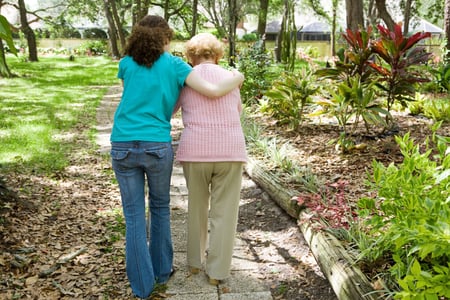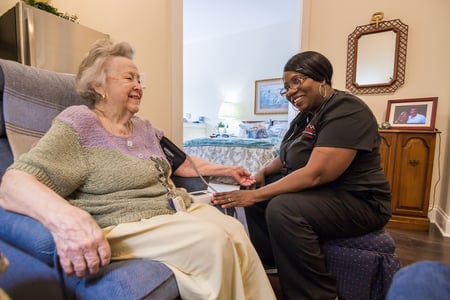
When you start a new job or career, you’ve probably had experience with similar roles before. You’ve likely gone through several interviews, had sufficient training, and typically have a good idea of what to expect in your new position.
Caregiving is entirely different, though. It’s estimated that approximately 40 million people in the United States are informal caregivers, providing unpaid care to an adult over 50, usually an aging parent or family member. Many of these 40 million people have something in common: they found themselves in the role of caregiver with no warning, experience, or expectations. They didn’t have several weeks of interviews; they didn’t get training or a manual.
Brickmont Assisted Living offers assisted living and memory care services throughout Atlanta, Georgia. We know how challenging it can be to navigate the caregiver journey with little to no experience, so we’ve created a sample job description of what it’s like to be a senior caregiver.
Understanding Your Role: Caregiver Summary
A senior caregiver plays a crucial role in the health, safety, and well-being of their older parent or family member. A caregiver allows an older adult to age safely and happily in their own home, which gives them a sense of independence while still receiving basic non-medical care and assistance.
Providing senior care can often resemble a full-time job and may require you to be available on short notice. However, even with the numerous demands and duties, this is a highly valuable position that offers fulfillment, relationships, and personal growth.
Responsibilities & Duties
Please keep in mind that every older adult has unique needs, and not everything that is listed here is always needed or needed to the degree described.
- Assist with personal care and hygiene. Personal care can include bathing, grooming, brushing teeth, dressing, etc.
- Help with mobility, inside and outside the house. Depending on how physically active and mobile the adult is, this can be as involved as offering support and balance while getting up from a chair or providing supervision and assistance while going for a walk or jog. Mobility assistance can also include driving the adult to and from doctor’s appointments and other errands.
- Meal preparation and serving. Malnutrition and hunger continue to be prevalent issues for older adults in the United States. Senior care often includes grocery shopping, healthy meal preparation, and, in some cases, assistance with eating. If your family member is still relatively active and healthy, helping with meals could be as simple as picking up groceries and dropping them off every week.
- Aid with light housekeeping. Some older adults may not need assistance with eating or mobility but simply need help with household chores. A caregiver may come to their house as required and assist with laundry, dishes, home maintenance or repairs, or anything else that needs to be done around the house.
- Medication reminders and/or administration. While senior caregivers don’t typically assist in actual medical care, they are often tasked with keeping medication schedules and ensuring their family member takes prescribed medicine safely and properly.
- Provide companionship. Above all else, a senior caregiver will provide socialization and quality time. This companionship can range from going on outings and exercising together to merely enjoying each other’s company over a cup of coffee/tea.
Skills Needed To Find Success in This Role
- Compassion, Understanding, Empathy
- Patience
- Communication skills (Some older adults or those with dementia can be non-verbal.)
- Time-Management
- Organization
- Observation (Your family member may not be able to tell you what they need, and you may have to determine what they need through observing behavior.)
- Physical Stamina (Senior care may require you to be on your feet for long periods.)
- Positivity, Gratitude, and Self Care
Perks & Benefits
Caring for an older loved one can be a tough job, but it comes with unique rewards that you won’t find anywhere else.
- You will know that your loved one is in good hands.
- You will become confident in your ability and your skills.
- You will learn to appreciate the little things in life.
- You will get to spend precious time with your loved one.
- You will gain a sense of purpose and fulfillment.
We hope this helped you gain a basic understanding of what to expect when becoming a senior caregiver. Of course, everybody has their own unique needs, and one caregiver’s responsibilities may be completely different from others. It can be a challenging, demanding job, but the irreplaceable moments can make it all worth it.
If you are new to caregiving, we invite you to contact the team at Brickmont Assisted Living in Atlanta, Georgia. We can help guide you through this journey, explain our respite care services, and offer support. We look forward to hearing from you!




.png)